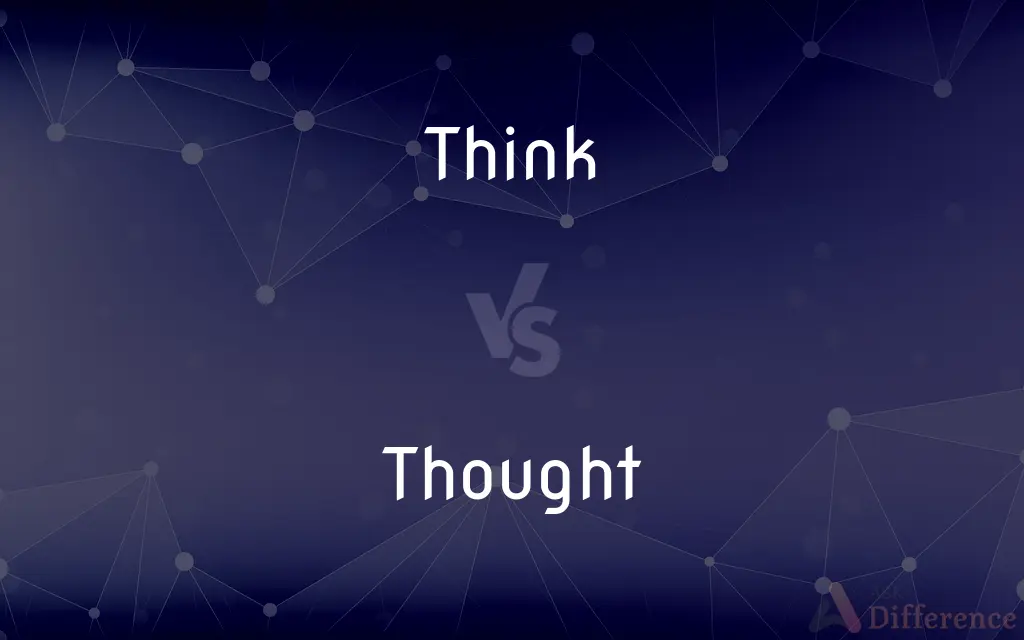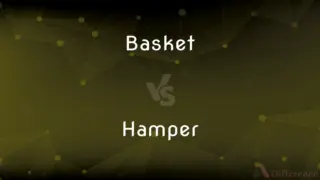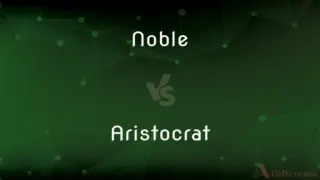Think vs. Thought — What's the Difference?
By Maham Liaqat & Urooj Arif — Updated on March 13, 2024
Think refers to the process of considering or reasoning, while Thought is the past tense of think or a noun for a conceived idea.

Difference Between Think and Thought
Table of Contents
ADVERTISEMENT
Key Differences
Think is the present tense verb form, denoting the act of considering, reasoning, or contemplating something at the moment. It implies an ongoing process or action. On the other hand, Thought can be the past tense and past participle of think, referring to the action of thinking that has already occurred, or it can function as a noun representing an idea, plan, or opinion formed by thinking or occurring suddenly in the mind.
When used as a verb, 'think' suggests an action that is currently taking place, as in actively engaging in the process of forming opinions or making decisions. Whereas, 'thought' as a verb signifies that the thinking process happened in the past, and as a noun, it refers to the product of that process - the idea or opinion itself.
The verb 'think' is dynamic, indicating a process that might be ongoing or repeated, often used to express intentions, predictions, or plans for the future. In contrast, 'thought' as a noun encapsulates a more static concept, representing a singular idea or a series of ideas that have already been considered or formulated.
In terms of usage, 'think' is often found in various tenses and constructions to express different aspects of the thinking process, such as "I think," "I am thinking," or "I will think." 'Thought', however, when used as a noun, does not change form and can be pluralized as 'thoughts' to indicate multiple ideas or considerations.
The transition from 'think' to 'thought' reflects a shift from an active, ongoing process to a completed action or a finalized concept. This distinction is crucial in understanding the temporal and conceptual differences between thinking in the present and having thought in the past or considering the outcome of thinking as a noun.
ADVERTISEMENT
Comparison Chart
Part of Speech
Verb (present tense)
Verb (past tense) or Noun
Definition
To consider or reason about something
The action of thinking (past) or a conceived idea
Usage
Expresses ongoing or future consideration
Indicates past consideration or an idea formed
Example Sentence
"I think about you often."
"I thought about it." / "A thought crossed my mind."
Conjugation
Thinks, Thinking, Think
Thought (past and past participle)
Compare with Definitions
Think
Present Tense Verb
I think he will join us for dinner.
Thought
Past Tense Verb
He thought the meeting was tomorrow.
Think
Active Process
She always thinks before speaking.
Thought
Mental Content
His thoughts were elsewhere.
Think
Opinion Expression
I think this is a great idea.
Thought
Reflection Action
She thought about it all night.
Think
Consideration Action
Think carefully about your options.
Thought
Conceptual Product
The thought of leaving saddened her.
Think
Future Planning
We need to think about our next steps.
Thought
Noun - Idea
That's an interesting thought.
Think
To have or formulate in the mind
Think the happiest thought you can think.
Thought
Thought (or thinking) encompasses a flow of ideas and associations that can lead to logical conclusions. Although thinking is an activity of an existential value for humans, there is still no consensus as to how it is adequately defined or understood.
Think
To reason about or reflect on; ponder
Think how complex language is. Think the matter through.
Thought
Past tense and past participle of think.
Think
To decide by reasoning, reflection, or pondering
Thinking what to do.
Thought
The process of thinking; cogitation
Sitting deep in thought at the computer.
Think
To judge or regard; look upon
I think it only fair.
Thought
A product of thinking or other mental activity
What are your thoughts on this matter?.
Think
To believe; suppose
Always thought he was right.
Thought
The faculty of thinking or reasoning
Why not use thought instead of emotion to solve the problem?.
Think
To expect; hope
They thought she'd arrive early.
Thought
The intellectual activity or production of a particular time or group
Ancient Greek thought.
Deconstructionist thought.
Think
To intend
She thinks to defeat the incumbent in the election.
Thought
Consideration; attention
Didn't give much thought to what she said.
Think
To call to mind; remember
I can't think what her name was.
Thought
Intention; purpose
My thought is to live in a house on a lake.
Think
To visualize; imagine
Think what a scene it will be at the reunion.
Thought
Expectation or conception
She had no thought that anything was wrong.
Think
To devise or evolve; invent
Thought up a plan to get rich quick.
Thought
(countable) Representation created in the mind without the use of one's faculties of vision, sound, smell, touch, or taste; an instance of thinking.
The greatest weapon against stress is our ability to choose one thought over another.
Think
To bring into a given condition by mental preoccupation
He thought himself into a panic over the impending examination.
Thought
(uncountable) The operation by which mental activity arise or are manipulated; the process of thinking; the agency by which thinking is accomplished.
Without freedom of thought there can be no such thing as wisdom, and no such thing as public liberty without freedom of speech.
Think
To concentrate one's thoughts on; keep as a point of focus
Think victory.
Thought
(uncountable) A way of thinking (associated with a group, nation or region).
Traditional eastern thought differs markedly from that of the west.
Think
To exercise the power of reason, as by conceiving ideas, drawing inferences, and using judgment
My cold made it difficult to think.
Thought
Anxiety, distress.
Think
To consider or weigh an idea
They are thinking about moving.
Thought
(uncountable) The careful consideration of multiple factors; deliberation.
After much thought, I have decided to stay.
Think
To bring a thought to mind by using the imagination
No one before had thought of bifocal glasses.
Thought
A very small amount, distance, etc.; a whit or jot.
Think
To recall a thought or an image to mind
She thought of her childhood when she saw the movie.
Thought
Simple past tense and past participle of think
Think
To have a belief, supposition, or opinion
He thinks of himself as a wit. It's later than you think.
Thought
The act of thinking; the exercise of the mind in any of its higher forms; reflection; cogitation.
Thought can not be superadded to matter, so as in any sense to render it true that matter can become cogitative.
Think
To have care or consideration
Think first of the ones you love.
Thought
Meditation; serious consideration.
Pride, of all others the most dangerous fault,Proceeds from want of sense or want of thought.
Think
To use the mind in a certain way
He thinks just like you do—always worrying.
Thought
That which is thought; an idea; a mental conception, whether an opinion, judgment, fancy, purpose, or intention.
Thus Bethel spoke, who always speaks his thought.
Why do you keep alone, . . . Using those thoughts which should indeed have diedWith them they think on?
Thoughts come crowding in so fast upon me, that my only difficulty is to choose or to reject.
All their thoughts are against me for evil.
Think
Requiring much thought to create or assimilate
A think book.
Thought
Solicitude; anxious care; concern.
Hawis was put in trouble, and died with thought and anguish before his business came to an end.
Take no thought for your life, what ye shall eat, or what ye shall drink.
Think
The act or an instance of deliberate or extended thinking; a meditation.
Thought
A small degree or quantity; a trifle; as, a thought longer; a thought better.
If the hair were a thought browner.
This [faculty], to which I gave the name of the "elaborative faculty," - the faculty of relations or comparison, - constitutes what is properly denominated thought.
Think
(transitive) To ponder, to go over in one's head.
Idly, the detective thought what his next move should be.
Thought
The content of cognition; the main thing you are thinking about;
It was not a good idea
The thought never entered my mind
Think
(intransitive) To communicate to oneself in one's mind, to try to find a solution to a problem.
I thought for three hours about the problem and still couldn’t find the solution.
Thought
The process of thinking (especially thinking carefully);
Thinking always made him frown
She paused for thought
Think
(intransitive) To conceive of something or someone (usually followed by of; infrequently, by on).
I tend to think of her as rather ugly.
Thought
The organized beliefs of a period or group or individual;
19th century thought
Darwinian thought
Think
(transitive) To be of opinion (that); to consider, judge, regard, or look upon (something) as.
At the time I thought his adamant refusal to give in right.
I hope you won’t think me stupid if I ask you what that means.
I think she is pretty, contrary to most people.
Boxing is thought to be a dangerous sport.
Thought
A personal belief or judgment that is not founded on proof or certainty;
My opinion differs from yours
What are your thoughts on Haiti?
Think
(transitive) To guess; to reckon.
I think she’ll pass the examination.
Think
To plan; to be considering; to be of a mind (to do something).
Think
To presume; to venture.
Think
To seem, to appear.
Think
An act of thinking; consideration (of something).
I'll have a think about that and let you know.
Think
To seem or appear; - used chiefly in the expressions methinketh or methinks, and methought.
Think
To employ any of the intellectual powers except that of simple perception through the senses; to exercise the higher intellectual faculties.
For that I amI know, because I think.
Think
To call anything to mind; to remember; as, I would have sent the books, but I did not think of it.
Well thought upon; I have it here.
Think
To reflect upon any subject; to muse; to meditate; to ponder; to consider; to deliberate.
And when he thought thereon, he wept.
He thought within himself, saying, What shall I do, because I have no room where to bestow my fruits?
Think
To form an opinion by reasoning; to judge; to conclude; to believe; as, I think it will rain to-morrow.
Let them marry to whom they think best.
Think
To purpose; to intend; to design; to mean.
I thought to promote thee unto great honor.
Thou thought'st to help me.
Think
To presume; to venture.
Think not to say within yourselves, We have Abraham to our father.
Think
To conceive; to imagine.
Charity . . . thinketh no evil.
Think
To believe; to consider; to esteem.
Nor think superfluous other's aid.
Think
Act of thinking; a thought.
Think
An instance of deliberate thinking;
I need to give it a good think
Think
Judge or regard; look upon; judge;
I think he is very smart
I believe her to be very smart
I think that he is her boyfriend
The racist conceives such people to be inferior
Think
Expect, believe, or suppose;
I imagine she earned a lot of money with her new novel
I thought to find her in a bad state
He didn't think to find her in the kitchen
I guess she is angry at me for standing her up
Think
Use or exercise the mind or one's power of reason in order to make inferences, decisions, or arrive at a solution or judgments;
I've been thinking all day and getting nowhere
Think
Recall knowledge from memory; have a recollection;
I can't remember saying any such thing
I can't think what her last name was
Can you remember her phone number?
Do you remember that he once loved you?
Call up memories
Think
Imagine or visualize;
Just think--you could be rich one day!
Think what a scene it must have been!
Think
Focus one's attention on a certain state;
Think big
Think thin
Think
Have in mind as a purpose;
I mean no harm
I only meant to help you
She didn't think to harm me
We thought to return early that night
Think
Decide by pondering, reasoning, or reflecting;
Can you think what to do next?
Think
Ponder; reflect on, or reason about;
Think the matter through
Think how hard life in Russia must be these days
Think
Dispose the mind in a certain way;
Do you really think so?
Think
Have or formulate in the mind;
Think good thoughts
Think
Be capable of conscious thought;
Man is the only creature that thinks
Think
Bring into a given condition by mental preoccupation;
She thought herself into a state of panic over the final exam
Common Curiosities
Is 'think' ever used as a noun?
No, 'think' is not used as a noun; it functions as a verb.
How do 'think' and 'thought' relate in terms of time?
'Think' refers to the present or future, indicating an ongoing or future action, whereas 'thought' as a verb refers to the past, and as a noun, it refers to the result of thinking.
How can 'thought' be used to express emotion?
'Thought' can convey emotions indirectly through expressions like "The thought of you makes me happy."
How does 'think' change in different tenses?
'Think' changes to 'thought' in the past tense and 'thinking' in the present participle.
Can 'thought' be used as a verb?
Yes, 'thought' is the past tense and past participle of the verb 'think'.
Is 'think' used in idiomatic expressions?
Yes, 'think' appears in idioms like "think outside the box" or "think twice".
Can 'thought' refer to a fleeting idea?
Yes, as a noun, 'thought' can refer to a sudden or fleeting idea that crosses the mind.
What is the main difference between 'think' and 'thought'?
'Think' is the present tense verb for considering or reasoning, while 'thought' can be the past tense of 'think' or a noun for an idea or concept.
Is 'think' always an active process?
Yes, 'think' implies an active engagement in forming ideas or opinions.
Are there any cultural variations in the use of 'think' and 'thought'?
While the basic meanings of 'think' and 'thought' are consistent, cultural nuances might affect their use in expressions or idioms.
Can 'thoughts' be plural?
Yes, when 'thought' is used as a noun, it can be pluralized to 'thoughts' to indicate multiple ideas or considerations.
What does it mean to have a 'second thought'?
It means to reconsider a decision or opinion, reflecting doubt or a change of mind.
How do 'think' and 'thought' compare in cognitive psychology?
In cognitive psychology, 'think' refers to the process of cognition, whereas 'thought' refers to the content or product of that process.
How does context affect the use of 'think' and 'thought'?
Context determines whether 'think' or 'thought' is appropriate based on the time frame or the nature of the idea being expressed.
Can 'thought' be used to describe collective ideas?
Yes, 'thought' as a noun can refer to collective or shared ideas, as in "the thought of the day" or "a school of thought".
Share Your Discovery

Previous Comparison
Basket vs. Hamper
Next Comparison
Noble vs. AristocratAuthor Spotlight
Written by
Maham LiaqatCo-written by
Urooj ArifUrooj is a skilled content writer at Ask Difference, known for her exceptional ability to simplify complex topics into engaging and informative content. With a passion for research and a flair for clear, concise writing, she consistently delivers articles that resonate with our diverse audience.














































